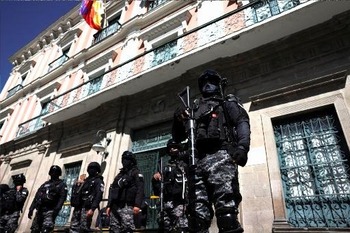-
 June 28, 2024By Manuel Rueda, OSV News
June 28, 2024By Manuel Rueda, OSV News
(OSV News) -- Bolivia's bishops' conference rejected an apparent coup attempt that took place June 26 in the South American nation and called for guarantees for the "peaceful coexistence" of Bolivia's citizens.
In a statement published on Facebook, the bishops called for the creation of "spaces for dialogue to solve conflicts" and for "respect the constitutional order."
A political crisis has been simmering in Bolivia, as protests over fuel shortages intensify, while teachers and other public servants have also recently taken to the streets to demand pay raises and better pensions.
The crisis took a more drastic turn June 26 as a group of soldiers led by Gen. Juan José Zuñiga attempted to storm the presidential palace in the capital city of La Paz with an armored vehicle -- with the general telling reporters outside the building that he wanted President Luis Arce to pick a new government Cabinet.
The rebellion in the Andean nation was short lived, it appears, because of a lack of support from military units elsewhere in the capital city. Close to three hours after arriving at the presidential palace, Zuñiga and his troops were filmed leaving the area in their armored vehicles, as they were heckled by hundreds of government supporters who had arrived at a square that faces the presidential palace.
Meanwhile, Arce named new chiefs for Bolivia's army, navy and air force, in a televised ceremony held at the presidential building known as the Great House of the People.
"Today we faced an attempted coup by troops who are staining the uniform, who are attacking our constitution," Arce said in a calm voice, as he spoke behind a presidential podium. "But we also have soldiers who know that the most important thing is to uphold our laws and respect our constitution."
Zuñiga was arrested that night, but spoke to reporters before he was ushered into a police vehicle.
The general accused Arce of masterminding the coup attempt in order to boost the popularity of Bolivia's ailing government.
"On Sunday, in the La Salle school, I met with the president," Zuñiga said. "And he told me that the situation was screwed up, that this week is going to be critical, and that we have to do something to 'raise my popularity.'" He added, "So I asked (the president) if we should take out the armored vehicles, and he said, 'Go ahead.'"
Zuñiga did not provide any evidence to back his claims, which were rejected by Bolivian officials, who accused the general of lying.
"Zuñiga's versions of a self-induced coup lack any kind of veracity," government minister Eduardo del Castillo told The Associated Press. On June 27, it was reported that, including the general, a total of 17 people had been arrested in connection with the attempted coup.
Members of Bolivia's opposition, meanwhile, called for a thorough investigation into the incident.
"Bolivia deserves a clear explanation of what happened, not a 'victimization' of Arce," Jorge Quiroga, a former Bolivian president, wrote on the social media platform X.
Reports showed that Arce's approval rating dropped below 40% in May, as the nation struggles with a shortage of U.S. dollars, declining gas production, and diminishing central bank reserves.
But legislation required to increase government revenues and ease dollar shortages has been stalled in congress by Arce's own party, the Movement for Socialism (Movimiento al Socialismo), which is now split in a faction that supports Arce and a faction that supports Evo Morales, the union leader who was Bolivia's president from 2006 to 2019 -- and who resigned after the military suggested he do so, following his reelection for a fourth term amid fraud accusations that led to large protests.
Meanwhile, other church leaders expressed solidarity with the Bolivian people amid the unrest. L'Osservatore Romano reported that Msgr. Vincenzo Turturro, Paraguay's apostolic nuncio who was representing the Holy See at the 54th regular session of the General Assembly of the Organization of American States said the Holy See joined the international community in "deploring and condemning" the attempted coup.
Likewise, the Latin American bishops' council, known as CELAM, sent a June 27 message to the president of the Bolivian bishops' conference, expressing their closeness and support in light of the events that sought to "perturb the democratic and constitutional order."
"We support the message that the Bolivian bishops have released repudiating this event, calling for peaceful coexistence and the search for solutions to conflicts through dialogue," read the message. "We feel deeply united with the Church on pilgrimage in Bolivia and its pastors, encouraging them to continue to make present the message of fraternity and commitment that will allow us to advance towards paths that seek the common good, which is the basis of democracy, for all Bolivians."
Bolivia is scheduled to hold presidential elections in 2025, and Arce, Morales and several opposition leaders from conservative parties have expressed interest in running.
A December ruling by Bolivia's constitutional tribunal bars Morales from running again due to term limits, but the former president is challenging the decision.
